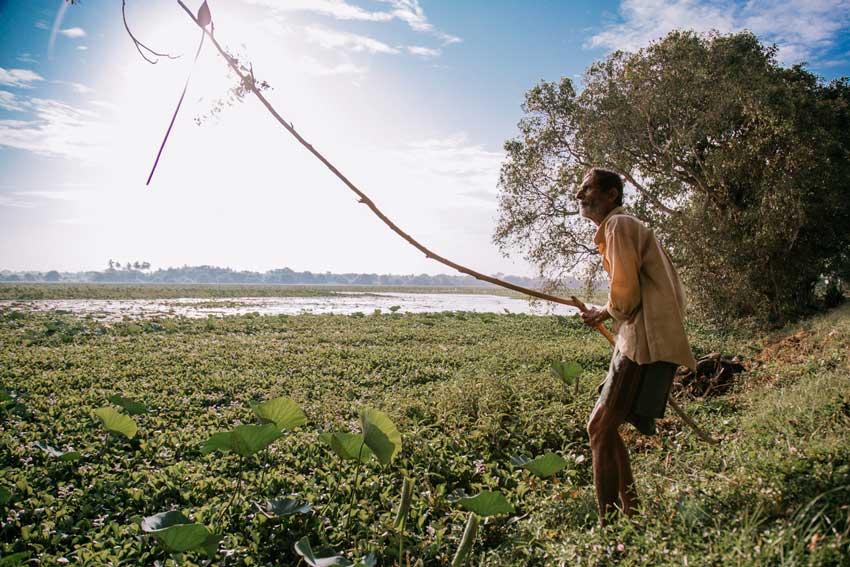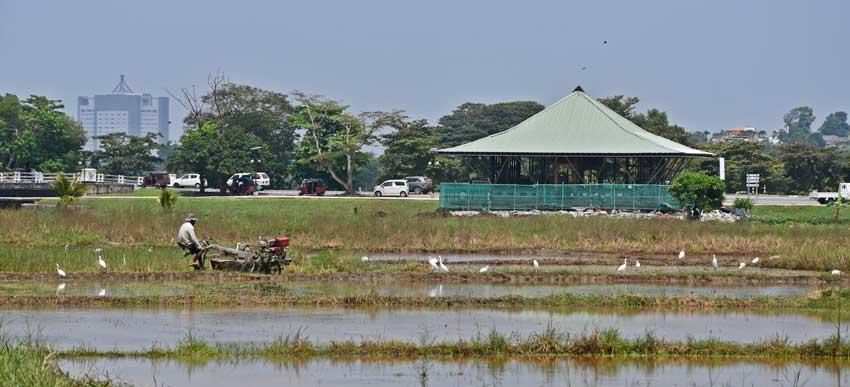Reply To:
Name - Reply Comment
Last Updated : 2024-04-19 00:03:00

 With Earth Day marked on April 22, we look to nature’s solutions to climate change and other challenges. Wetland preservation is vital for our environmental, food and societal futures.
With Earth Day marked on April 22, we look to nature’s solutions to climate change and other challenges. Wetland preservation is vital for our environmental, food and societal futures.
Take a tuk-tuk ride in Colombo, the capital city of Sri Lanka and the chances are with every odd turn you’ll manoeuver past a lake. Water bodies including marshes, mangroves and paddy fields are a common sight among the hustle and bustle of city life, forming a wetland complex trapping pollutants and cooling the air.
“Imagine,” Chris Dickens, principal researcher at the International Water Management Institute (IWMI) asked a darkened room of people at a resort in Bentota, Sri Lanka. “What would happen if you changed all those wetlands into concrete?”
His audience, employees of the Norwegian Embassy in Sri Lanka on a staff retreat pondered the question. The Embassy had invited Dickens to make a presentation on climate change and wetlands during the educational component of their annual staff retreat (luckily, a time long before COVID-19 and social distancing).
The topic hits home for Sri Lanka. Colombo is one of eighteen cities — and the only capital — to be designated a “Wetland City” by the International Ramsar Convention Secretariat.
What happens when towering skyscrapers and parking lots smooth over the lakes? Hotter days, said Dickens. Increased disaster risk, with rainwater building and sweeping through the city. Wetlands regulate air temperature and prevent floods, the large bodies of water trapping heat and collecting storm-water, helping adapt to and mitigate the effects of climate change.
Dickens is one of several IWMI researchers conducting research to better understand the often overlooked value of preserving wetlands in Sri Lanka as well as in Asia and Africa. Their findings highlight wetlands as important natural infrastructure that underpins the health and integrity of cities and landscapes – and our Earth in general. This is particularly vital as we face the climate crisis.

The Kimbulawala paddy fields, part of the urban wetlands in Colombo (Photo credit: Samurdhi Ranasinghe / IWMI)
Temperature control and other benefits
Wetlands can play a critical role in adapting to climate change and protecting our planet.
Temperatures in Colombo, for instance, are rising. The World Bank has recognized South Asia as particularly vulnerable to climate change, with temperatures in Sri Lanka increasing 1.0°C to 1.5°C from 1950 to 2010.
“It is warmer than it was before,” said a participant who attended Dickens’ talk and lives in Colombo, noting the high temperatures give her headaches. Compared to twenty years ago, when the air felt cooler, she now avoids going outside between 11am and 3 pm during the peak heat.
“It’s so hot. And it wasn’t like this before,” she said. “I feel the heat so much more now than I used to.”
Wetlands, among their various benefits, can control the heat. “Those wetlands are cooling the whole city down,” Dickens said during his talk, pointing at a graph tracing the differences in temperature in urban areas with, and without, wetlands.
The largest jump, he noted, happens around noon. “Four degrees!” he said. “It’s a lot.” It can be the difference between switching air conditioning on, Dickens said and thus affect energy usage.
And in climates where rainfall is heavy and frequent, wetlands absorb water, offering flood control and addressing storm risks. In 2010, for instance, Sri Lanka experienced its highest rainfall in eighteen years, shutting down schools in the Western Province and displacing 36,000 families.
The Asian Development Bank and IWMI have found climate change contributes to the extreme rainfall experienced by the nation. Flood risks have been on the rise in Colombo, with increases in average annual rainfall over the past three decades.
Preserving natural infrastructure, such as wetlands, can capture storm water and decrease flood risk, helping communities adapt to increased climate variability.
Important carbon sinks
In addition, wetlands can support climate change mitigation by absorbing and storing carbon. While some wetlands release methane when water levels decrease and organic material is exposed, wetlands also absorb atmospheric carbon in vegetation and trap it in soil and sediment.
The interplay between greenhouse gases in a wetland is complicated, admits Matthew McCartney, Research Group Leader for Sustainable Infrastructure and Systems at IWMI. Yet, certain wetlands, such as mangroves and coastal wetlands capture more carbon than they release. And at the global level, McCartney says, there is a net positive trade-off to protecting wetlands.
For instance, the loss of one hectare of mangroves is equivalent to the loss of 3-5 hectares of tropical forest when it comes to releasing stored carbon into the environment. The massive amounts of carbon already stored in wetlands and mangrove make preserving such areas a top priority for reducing greenhouse gas emissions.
The future of wetlands
From trapping carbon to limiting floods and droughts and protecting against storms, wetlands play a critical role in adapting to and mitigating climate change impacts. Preserving these natural spaces from being drained, built-over for development or covered by trash is key to retaining nature-based solutions for climate action.
Unfortunately, all is not good in Colombo, Dickens says. “This is a rubbish dump which is encroaching on a wetland,” he explained during his talk, pointing at a photo of a lake littered with plastic bottles and bags. “We’re losing wetlands rapidly.”
Wetlands cover around 20 square kilometres of Colombo, but around 58 acres, or 1.2 per cent, are lost each year. Despite the government legally protecting 17 per cent of the city’s wetlands, the land is often filled to serve private or commercial interests.
And there are consequences. If Colombo were to lose all its wetlands, according to a World Bank study, additional flood damage would cause the city to risk losing one per cent of its gross domestic product on average every year.
Plans, however, are in place to protect the natural water bodies. The Capital City Development Plan for 2019-2030 embraces the value of wetlands, focusing particularly on flood mitigation and taking a comprehensive approach to conserving wetland ecosystems throughout the city. The city’s strategy also includes establishing two urban wetland parks with information centres and additional legal protections for these areas.
Adhering to these development plans will speak to Colombo’s designation as a ‘wetland city’ under the Ramsar Convention and the city’s commitment to the “wise use” of wetlands. Whether it is a forest of mangroves or a lake reflecting the cityscape, wetlands provide natural infrastructure to adapt to climate change.
Incorporating and enhancing wetlands in urban areas increases societal resilience to climate shocks. And preserving these lands helps the city implement sustainable development. Stronger policies and public education will pave the path forward. Wetlands depend on it. And so does our Earth.
Dinesh Jayasinghe Saturday, 25 April 2020 12:33 PM
Dont say earth under stress its human under stress and damage earth ! Those who ever whether Donald Trump goes against earth will face consequence by nature, Today its proved by COVID19, all homeless to superior leaders shocked !. Their security, mansions no more valid, including queen Elizabeth inside Buckingham Palace !

Add comment
Comments will be edited (grammar, spelling and slang) and authorized at the discretion of Daily Mirror online. The website also has the right not to publish selected comments.
Reply To:
Name - Reply Comment
On March 26, a couple arriving from Thailand was arrested with 88 live animal
According to villagers from Naula-Moragolla out of 105 families 80 can afford
Is the situation in Sri Lanka so grim that locals harbour hope that they coul
A recent post on social media revealed that three purple-faced langurs near t

10 Apr 2024
09 Apr 2024